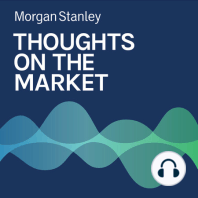3 min listen

Michael Zezas: Why Isn’t Fed Hiking Impacting Inflation?
Michael Zezas: Why Isn’t Fed Hiking Impacting Inflation?
ratings:
Length:
3 minutes
Released:
Sep 21, 2022
Format:
Podcast episode
Description
Though the Fed continues to raise interest rates, inflation is still high year over year, so why haven’t rate hikes begun to bring inflation down yet?----- Transcript -----Welcome to Thoughts on the Market. I'm Michael Zezas, Head of Global Thematic and Public Policy Research for Morgan Stanley. Along with my colleagues, bringing you a variety of perspectives, I'll be talking about the intersection between U.S. public policy and financial markets. It's Wednesday, September 21st at 10 a.m. in New York. The Fed continues to hike interest rates, but inflation is still running hot in the U.S. as demonstrated by last week's 8.3% year over year growth in the Consumer Price Index. When and how the Fed will eventually succeed in dampening inflation is an important consideration for markets, but investors should also focus on another question. Why hasn't fed hiking worked to bring down inflation yet? Well, there's a strong case to be made that the U.S. economy is less sensitive to changes in interest rates today than it has been in the past. In total, about 90% of all household debt today is fixed rate, meaning that as the Fed hikes rates and market rates rise, consumers’ debts don't cost them more to service. If they did, then rising interest rates would dampen economic growth by dampening aggregate demand. Those higher rates would in theory crimp consumption, as households direct less of their money toward buying goods and services and more toward paying their debts. That, in turn, would ease inflation. Understanding this dynamic is important for investors in a few ways. Take the housing market, for example. After the housing crisis that touched off the global financial crisis in 2008 and 2009, adjustable rate mortgages only now make up a small fraction of all mortgages. Sure, higher mortgage rates means buying a new home is effectively more expensive, but with so many more mortgages in the U.S. carrying a fixed rate and issued to individuals with higher credit scores, the cost of owning a home to current owners hasn't changed. That means there's little incentive for homeowners to sell and or reduce the asking price for their home. Hence, our housing strategists expect home sales to decline meaningfully, but you may not see a lot of price deterioration in the aggregate. The bond market is another place we see this dynamic on display. Our interest rate strategy team expects you'll see the yield curve continue to flatten and invert, with shorter maturity yields rising faster than longer ones. Why? Because shorter maturities typically track the Fed funds rate, which the Fed has clearly stated will continue going higher until there's clear evidence of inflation deceleration, which could take longer given the economy's lessened sensitivity to rising rates. For bond investors, the bottom line is you should consider something that historically has been pretty unusual - longer maturities might perform better even as rates go higher. Thanks for listening. If you enjoy the show, please share Thoughts on the Market with a friend or colleague, or leave us a review on Apple Podcasts. It helps more people find the show.
Released:
Sep 21, 2022
Format:
Podcast episode
Titles in the series (100)
Andrew Sheets: For Markets, Signs, Signs, Everywhere Signs by Thoughts on the Market